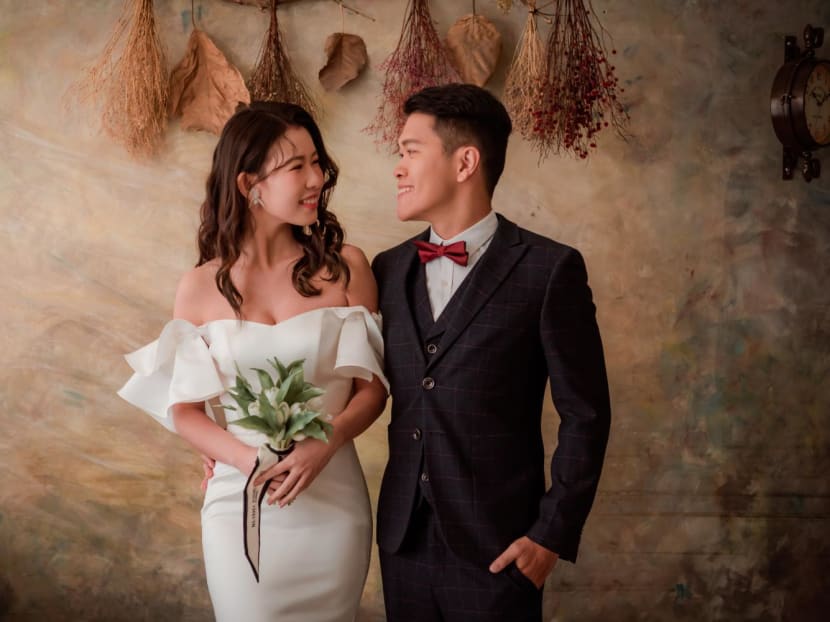Slaying Inflation: How a young couple are sticking to their wedding budget by choosing only the 'must-haves'
SINGAPORE — You could say it was almost love at first sight for Ms Chan Yi Zhen and Mr Robin Wong when they met six years ago as hallmates in Nanyang Technological University.

Ms Chan Yi Zhen and Mr Robin Wong met six years ago as hallmates in Nanyang Technological University.
Amid record inflation today, Singaporean youths are going through major life milestones, such as getting married, buying their first home and starting a family, all of which require big spending.
In this occasional series, TODAY takes a look at ways some youths are achieving their life goals while keeping to their budget.
In the second instalment, we talk to a couple who are sticking to a strict budget when planning for their big day.
The first instalment about a couple who are saving up for the downpayment of a home, can be found here..
- Ms Chan Yi Zhen and Mr Robin Wong started saving up together shortly after they started dating six years ago
- The couple set up a joint savings account together where they contributed a portion of their monthly income
- Though the couple initially thought of having a destination wedding, they scrapped that idea given the increasing cost of holding a big event
- They also decided to do away with a customised dress and invites
- TODAY spoke with wedding planners who offered alternatives to help couples stay within their budget
SINGAPORE — You could say it was almost love at first sight for Ms Chan Yi Zhen and Mr Robin Wong when they met six years ago as hallmates in Nanyang Technological University.
Shortly after they started dating, they both knew that marriage was on the cards and talked about holding a wedding some time in 2021. This set Ms Chan's wedding planning in motion — she started researching wedding vendors and then asked for quotes from venues and florists.
However, the 28-year-old's planning only went full steam ahead when Mr Wong, 30, who is self-employed, officially popped the question on July 7 last year. They are set to get married exactly a year later.
Since first approaching vendors in 2021, however, the couple has noticed a price hike for most of their items.
"The GST (goods and services tax) has since increased by 1 per cent but when it comes to anything to do with the wedding industry, the increases can be between 10 and 20 per cent," said Ms Chan, a public relations consultant.
Despite items for their wedding costing more this year compared to last, the couple decided that they would continue to work within their S$40,000 budget and make the day as special as ever, despite having to do away with some of their original plans.
"We don't have a choice and will just have to deal with the effects of inflation for our wedding... We just have to be more firm in making conscious decisions on what is important to us on this special day," said Ms Chan.
"It's about finding a sweet spot between our financial means and what we want for the wedding. I tried not to get caught up in the idea of a 'once in a lifetime' wedding or feel the need to spend more and more to make the day special."
TODAY sat down with the couple to talk about how they kept their budget manageable and how they saved up for their goal.
HOW DID YOU BOTH SAVE UP FOR THE WEDDING?
Mr Wong: We both knew we were going to get married to each other eventually, so it was only natural for us to start saving together. Neither of us also wanted to depend on our parents for any financial support for the wedding. For five years, a portion of our salaries have been automatically credited into a joint savings account. Even though we have had to make certain changes on what we spend on because of my job transition last September where I left civil service to become my own boss, this consistent savings habit has helped to keep us on target.
Ms Chan: We decided on S$40,000 as the amount we would be comfortable with spending on our big day, after taking into account that we may receive some ang baos from kind relatives and friends. We knew that we needed to save up for other things post marriage like a house, so we wanted to be disciplined about keeping to that amount. We decided on how much money we will need and then we started saving towards that on a monthly basis where we divided the contribution based on how much we earn. Whoever is earning more contributes to 60 per cent of that amount, while the other person contributes 40 per cent. We did not want to make it an equal contribution because it might not be fair to the one who is earning less.
HOW DID YOU ADJUST YOUR WEDDING PLANS GIVEN YOUR BUDGET?
Mr Wong: I had always dreamed of having a wedding overseas but we gave up on the idea of a destination wedding because the high costs would mean accommodating fewer guests and what's important to us is having as many of our friends and family around us on our special day. So while we couldn't have an outdoor bonfire somewhere as part of our wedding, we did budget for a yacht trip with our bridesmaids and groomsmen, which we feel will be similar to a mini-destination wedding.
We also considered renting a car that had a retro vibe, but it was too expensive. Luckily, we had a friend who offered to let us borrow his vintage car, which made for a more ideal option because it fit the style we were going for.
Ms Chan: To me, the "must-haves" were the venue and floral arrangements. We chose the Conrad Singapore Orchard because the food is supplied by their one Michelin star Chinese restaurant Summer Palace and it is important to us that our guests get to eat good food during our wedding dinner. While the hotel will supply flowers, I am set on a certain style for my floral arrangements which include a pink and white colour scheme, so I decided to engage an external vendor to help provide the bouquet, car decorations, and corsage. As long as the budget could cover these two things, I was fine with doing without other things or going for cheaper options given how prices have risen.
For example, I am okay with renting my dress instead of buying one or even spending money to customise a rented dress. I am also fine with not customising our invites and just using the ones the hotel is providing. This is going to save us money and also time!
WHAT SACRIFICES DO YOU BOTH MAKE ON A DAY-TO-DAY BASIS TO SAVE?
Mr Wong: I’ve had a budget for about four years now and I have gotten used to a specific monthly spending and plan to continue this even after the wedding. However, saving for my wedding has taught me to be more aware of what we spend on. For example, we forgo Starbucks for cheaper drink options at a coffee shop or replace cafe food for tastier hawker centre food. I would not necessarily call them sacrifices because the alternatives are just as good, if not better.
Ms Chan: Sometimes I do cut down on spending too much for lunches which can be quite expensive, especially since I am working in the CBD (central business district). I do have to think twice whenever my colleagues suggest going for $20 lunches. I also forgo sweet drinks — which is healthier for me anyway — and opt for plain water. Ordering drinks outside can cost quite a bit!
WHAT HAVE YOU LEARNT FROM SAVING?
Mr Wong: We're definitely more aware of what we are spending on and whether a certain item we are paying for actually gives us more enjoyment compared to a cheaper alternative. For example, we used to go on dates at the cinema, but these days, we are happy to just stay at home and stream movies on Netflix instead. This is one way that we can get to save a bit more and still not compromise on our enjoyment.
Ms Chan: I've been on this budget ever since I started working, which was almost five years ago, and I've learnt that you don't need to pay a lot or go somewhere expensive to have fun. We would typically choose to play card games at home, go for walks, explore different hawker centres or workout together.
WHAT WEDDING PLANNERS SAY
BUDGET MORE THAN YOU THINK AS PRICES HAVE INCREASED
The prices of fresh flowers, along with certain services, have increased significantly since the Covid-19 pandemic so it is important that couples budget more than they think they need to when planning a wedding, said Ms Jessica Chew, a principal wedding planner at Everitt Weddings.
Meanwhile, founder and creative director of Rosette Designs & Co Ms Hellen Lie pointed out that couples tend not to stick to their initial intended budget and "cannot resist overspending".
"Many times they will see something they like that will bust their budget. It is important for couples to include an additional cost of 20 per cent to their planning number," she said.
Couples also tend to forget to budget for wedding decorations, with many thinking it won't cost "that much", said Ms Chew.
She added that many also miss out on the cost of gratuities and accommodation for certain wedding attendees.
HOW TO STAY WITHIN BUDGET
Ms Lie said that there are many alternatives that couples can consider to save costs without fully compromising on their dream wedding.
For example, opting for a lunch or weekday wedding in a venue with a caterer as opposed to a dinner wedding at a hotel.
"Having a wedding lunch reception instead of a dinner is usually priced lower per person for a standard menu and incurs a lower alcoholic beverage expenditure," explained Ms Chew.
Ms Chew also suggests opting for a half-day wedding instead of a full-day one as lesser hours are required for hair and makeup, as well as, for photography and videography.
It also helps to not have multiple outfits but just a single one that can be transformed into two looks with slight adjustments.
"Couples can choose not to have certain wedding services as well, such as a wedding planner, hired bridal car, real wedding cake, photo booths, professional emcee and live music," said Ms Chew.
Instead of fresh floral decor, they can also opt for realistic-looking artificial floral arrangements, she said.
All these small changes, said Ms Chew, can significantly reduce the cost of holding a wedding.










